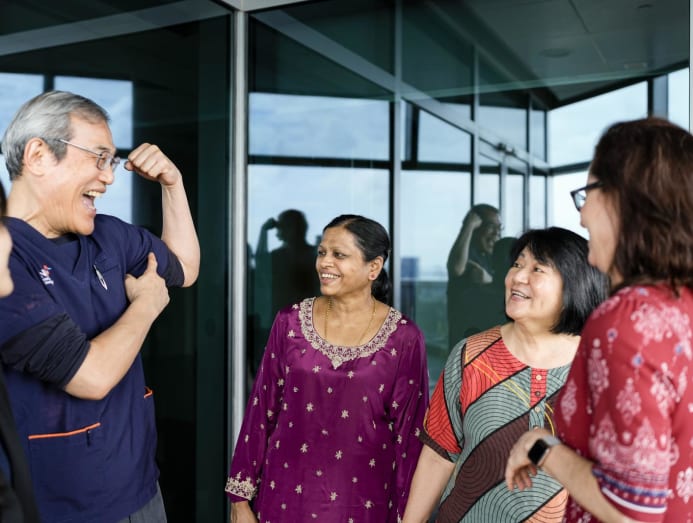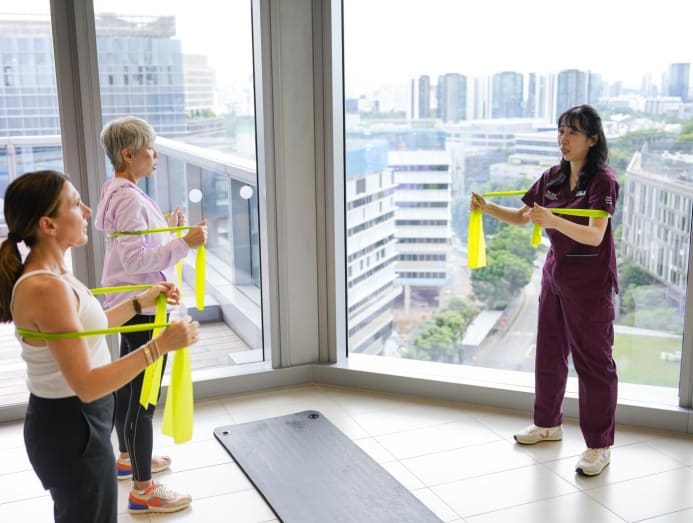View this post on InstagramA post shared by National University Hospital (@nuhig)
Menopause, poor muscle strength, leaking urine: How this 10-year study is helping women understand midlife health
A long-term programme by the National University of Singapore (NUS) and the National University Hospital (NUH) is aiming to answer questions about the health of midlife women in Singapore and close the gender healthcare gap.
Ethnicity and gender play a part in how health conditions present in individuals, and much of the medical research in the past has been based on Western participants, which may not apply to Asians.
Professor Yong Eu Leong, emeritus consultant at NUH’s Department of Obstetrics and Gynaecology, started the Integrated Women’s Health Programme (IWHP) in 2014.
This unique study, which recruited 1,201 women, focuses on the key health concerns of midlife women in Singapore, looking at female-specific health issues such as menopause, osteoporosis, anxiety, depression, pre-diabetes, pre-hypertension, urinary incontinence, poor sleep and hip fractures.
The IWHP is the largest and most comprehensive longitudinal cohort study of midlife women in Asia. It’s not just that it focuses on the health of women in midlife – a critical but often overlooked demographic – but the fact that it’s a longitudinal study is unique too.
Prof Yong, one of Singapore’s leading medical researchers who received the National Outstanding Clinician Scientist Award by National Medical Research Council Singapore (NMRC) in 2020, told CNA Women that there are very few overseas studies that track women longitudinally.
The insights from IWHP will help identify and address the unique healthcare needs of midlife women and help to close the knowledge gap in Singapore and globally.
One of its main aims is to study differences between ethnic groups, such as Singapore women and Caucasian women, said Prof Yong.
“Even within Singapore, there are different ethnic groups with different genetic dispositions, and it is expected that their symptoms and conditions will differ,” he added. “For example, Indians are genetically more closely related to Caucasians and may therefore differ from Chinese and Malays, who are more related to East-Asian genotypes.”

Baseline recruitment took place between 2014 and 2016, and the study began with 1,201 women aged between 45 and 69 years old, who were healthy and free of serious illnesses at the time.
The study followed up with this group at the six-year mark, from 2020 to 2023. Funding from the NMRC has been secured for the third follow-up visit, the 12-year follow-up, which is scheduled to start in 2026.
“All women participate in evaluations with the same set of questions at every visit, so that we can track the progression of multiple diseases as they age,” he added.
During the study visits, participants undergo a full-body scan to look at their bone mineral density, fat and muscle composition. They also do blood tests, fill in questionnaires and take part in some physical performance tests; these test outcomes are not disclosed to the women.
ASIAN WOMEN EXPERIENCE MENOPAUSE DIFFERENTLY
One of the main reasons the IWHP came about is because there is a significant gap in knowledge about the menopause transition, said Prof Yong.
“There is very little information available about menopausal changes relevant to Asian women generally and to Singapore women in particular,” he added. “This is despite menopause being a life-altering event for women, being of the same significance as menarche at puberty and childbirth during their reproductive years.”
It is not widely recognised that Asian women experience menopause differently from their Western or Caucasian counterparts, Prof Yong said.
For example, the most prominent symptom overseas is hot flushes. However, this only ranks fifth on the list of complaints for menopausal women in Singapore. The main complaint is muscle aches and joint pains, also known as arthralgia.
“Our pioneering IWHP studies have identified the cause of these muscle aches and joint pains to be related to the menopause transition, which was previously attributed to osteoarthritis, degeneration or general ageing,” said Prof Yong, who has authored more than 150 peer-reviewed publications to date.
“This is a huge advancement because many women who are suffering would no longer feel that it is abnormal and realise that they are not alone, and what they're experiencing is valid and part and parcel of menopause,” he added.
The study also identified probable causes for menopausal arthralgia, which include the sudden plunge in oestrogen levels related to other menopausal symptoms, poor muscle strength and poor physical performance.
PROVIDING SOLUTIONS FOR MIDLIFE WOMEN IN SINGAPORE
IWHP’s insights have resulted in over 30 publications across various academic journals on different aspects of midlife women’s health, including joint pains and muscle aches, anxiety, brain fog, sleep issues and mood changes.
Prof Yong said that the programme’s findings will help Singapore address issues faced by menopausal women.
Results were revealed in early 2023 of a study which found that low hand grip muscle strength and poor repeated chair stand performance are strongly associated with diabetes, independent of obesity.
Women with poor muscle strength had more than twice the risk of diabetes compared with those with normal muscle strength – this is independent of risk factors for diabetes such as age, race, education levels, menopausal status, smoking and obesity.

A recent paper tracked the pelvic floor function of the IWHP cohort over six years. It found that not only urinary incontinence, but bowel incontinence and pelvic floor prolapse are significant issues that plague over 20 to 30 per cent of women in Singapore as they undergo menopause.
A study found that the development of hypertension could be linked to pregnancy-related factors from many years ago.
Another study found that women who are predominantly Chinese speaking had inferior muscle strength and physical performance, leading to poorer overall health.
Besides reducing body mass index, the findings highlight that strength exercises and menopause hormone therapy are key lifestyle factors that increase the health span of women in midlife, Prof Yong added.
“Targeted implementation programmes are needed to improve muscle strength, especially in Chinese women with Chinese language preference, as well as for Indians and Malays,” he said.

The IWHP is currently conducting a study, The MUscle Strengthening exercises and Estrogen replacement therapy Randomised Control Trial (MUSE-RCT), which aims to reduce menopausal symptoms such as joint pain and hot flushes, which are often linked to poor sleep.
Prof Yong explained that sleep disruption can increase the risk of anxiety and depression, and these mental health challenges can reduce physical activity, leading to lower muscle strength and increased obesity.
This chain of effects contributes to higher risks of chronic diseases like diabetes, hypertension, and depression over time, creating a vicious circle and a downward spiral towards ill health in later years.
PARTICIPANTS ALREADY SEEING SOME BENEFITS
While IWHP’s research aims to help Singapore women understand their health issues better, the participants have already seen some benefits.
Sum Sui Cheng, 64, was approached to participate in IWHP while she was at the NUH Women’s Clinic. She told CNA Women that she was initially interested to find out more about cardiovascular health and bone mineral density.
“Participating in the IWHP has increased my awareness of the types of health risks women face as they age,” she said. “The physical and cognitive assessment tests also provide an indication of overall well-being as we grow older.”
Wong Lilin, 62, agreed to participate as she believed it would be beneficial for herself and other Singapore women “to understand health issues specific to us”.
“I found out a host of deficiencies in my blood work as a result of the study and a bone scan,” she recalled. “This strengthened my resolve to take better care of myself, and not just my children and family.”
Wong embarked on a more comprehensive journey to understand the body and all things related to health, diet, inflammation, drugs and medication.
“I am glad to say that I’m only on one necessary medication, taking proper supplements to complement what l lack, and relying on just diet and sunlight – instead of medication – to support my bone health,” she said. “I am thankful to be given the opportunity to be part of this journey.”
CNA Women is a section on CNA Lifestyle that seeks to inform, empower and inspire the modern woman. If you have women-related news, issues and ideas to share with us, email CNAWomen [at] mediacorp.com.sg.
Disclaimer: Investing carries risk. This is not financial advice. The above content should not be regarded as an offer, recommendation, or solicitation on acquiring or disposing of any financial products, any associated discussions, comments, or posts by author or other users should not be considered as such either. It is solely for general information purpose only, which does not consider your own investment objectives, financial situations or needs. TTM assumes no responsibility or warranty for the accuracy and completeness of the information, investors should do their own research and may seek professional advice before investing.
Most Discussed
- 1
- 2
- 3
- 4
- 5
- 6
- 7
- 8
- 9
- 10